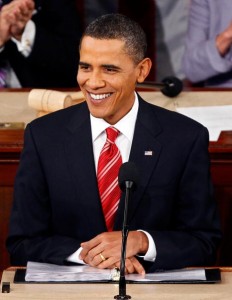 President Obama’s State of the Union address came at a politically fortunate time in his presidency. On the heels of the Arizona tragedy that took the lives of six people and injured 13 others, including congresswoman Gabrielle Giffords who is still bravely fighting through her ordeal, the president has political capital to espouse some of his most prized initiatives to Congress and the rest of the country.
President Obama’s State of the Union address came at a politically fortunate time in his presidency. On the heels of the Arizona tragedy that took the lives of six people and injured 13 others, including congresswoman Gabrielle Giffords who is still bravely fighting through her ordeal, the president has political capital to espouse some of his most prized initiatives to Congress and the rest of the country.
This tragedy has in some small way helped unify the country around President Obama after his well-received speech in Arizona… at least for the 53 percent or so who approve of the work he is doing as president, a dramatic turn from the low forties he was in just a few months ago.
The central themes to Obama’s 2026 State of the Union address were education, moving the country forward in the technologies of the future, and how we need to prepare the workforce for the 21st century economic realities.
Health care and food policy only inhabited a small portion of the address. Early in his speech, President Obama championed common sense regulatory policies, such as those that keep our food supply (relatively) safe and our water safe to drink.
The president’s health care reform bill has been a lightening rod for dividing left and right in this country. So, it was a good tactic to lead into that topic with a little light-hearted humor.
“Now, I’ve heard rumors that a few of you have some concerns about the new health care law. So let me be the first to say that anything can be improved. If you have ideas about how to improve this law by making care better or more affordable, I am eager to work with you.”
President Obama got a well-rounded standing ovation when he said that we need to start giving more respect to our teachers, in reference to the fact that South Koreans refer to their teachers as “nation builders.” But there was no mention of school nutrition. Not that it would be expected, since the State of the Union address is reserved for what the public wants to hear most from their president.
Even with jobs, education and infrastructure as the general themes, what loomed over most of the speech was the overwhelming need to reduce the deficit. Everyone wants a balanced federal budget, but next to nobody has a real solution to where you start doing significant cuts. The president mentioned that some of that reduction would have to come from Medicare and Medicaid. He also backed his health care plan with the help of economists who say that a wholesale repeal of the health care bill would lead to “a quarter of a trillion dollars [added] to our deficit.”
